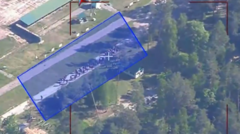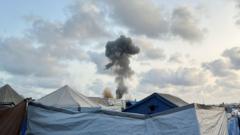President Vladimir Putin made his first visit to the Kursk region since Ukrainian forces' incursion last year, emphasizing a narrative of recovery despite ongoing conflict. The visit focused on a nuclear power plant and local volunteer efforts, while addressing the challenges faced by displaced civilians.
Putin's First Visit to Kursk Highlights Ongoing War Dynamics

Putin's First Visit to Kursk Highlights Ongoing War Dynamics
The Russian President toured the conflict-affected Kursk region amidst continuing hostilities, aiming to bolster local morale.
The visit marks a significant moment for President Vladimir V. Putin as he stepped into the Kursk region, situated in western Russia, for the first time since Ukrainian forces executed a surprise incursion last year. According to the Kremlin, the President toured a nuclear power plant under construction and interacted with volunteers aiding residents impacted by the ongoing conflict.
The visit, which took place a day prior to the Kremlin's announcement, seemed aimed at showcasing a sense of normalcy amid the persistent clashes in some parts of the region. The incursion initiated by Ukrainian forces in August had initially seen them seize approximately 500 square miles of Russian territory; however, momentum slowed, leading to a strategic response from Russian troops, supported by North Korean forces, that ultimately reclaimed much of the occupied territory.
As negotiations loom, Putin maintains that he will not engage in talks with Ukraine until Ukrainian forces yield in Kursk. His recent visit followed the first direct peace talks between Russian and Ukrainian officials in over three years, heightening the significance of his presence in the region.
The conflict, which has resulted in substantial casualties on both sides and inflicted harm on civilians, has led to a humanitarian crisis. Russian authorities have reported nearly 300 civilian deaths and 110,000 displaced individuals in Kursk, contradicting the government's narrative that presents the war as a remote "special military operation." The situation has provoked frustration among displaced civilians who have expressed dissatisfaction with government assistance and general societal apathy toward their plight.
In a bid to address these grievances, Putin promised monthly stipends of $800 to residents of border settlements during his televised meeting with local officials. This gesture seeks to bolster morale and demonstrate the government's commitment to supporting those affected by the conflict, even as it continues.
The visit, which took place a day prior to the Kremlin's announcement, seemed aimed at showcasing a sense of normalcy amid the persistent clashes in some parts of the region. The incursion initiated by Ukrainian forces in August had initially seen them seize approximately 500 square miles of Russian territory; however, momentum slowed, leading to a strategic response from Russian troops, supported by North Korean forces, that ultimately reclaimed much of the occupied territory.
As negotiations loom, Putin maintains that he will not engage in talks with Ukraine until Ukrainian forces yield in Kursk. His recent visit followed the first direct peace talks between Russian and Ukrainian officials in over three years, heightening the significance of his presence in the region.
The conflict, which has resulted in substantial casualties on both sides and inflicted harm on civilians, has led to a humanitarian crisis. Russian authorities have reported nearly 300 civilian deaths and 110,000 displaced individuals in Kursk, contradicting the government's narrative that presents the war as a remote "special military operation." The situation has provoked frustration among displaced civilians who have expressed dissatisfaction with government assistance and general societal apathy toward their plight.
In a bid to address these grievances, Putin promised monthly stipends of $800 to residents of border settlements during his televised meeting with local officials. This gesture seeks to bolster morale and demonstrate the government's commitment to supporting those affected by the conflict, even as it continues.



















